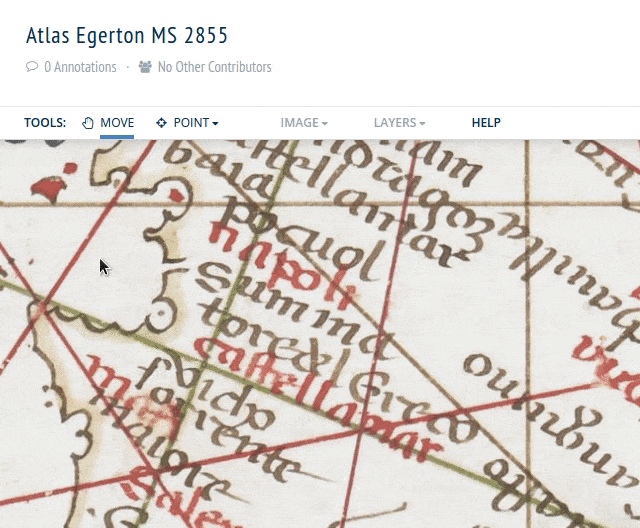Venue: Online
Dates:
- Friday, 28 April 2023 – 12:00 to 14:00 CEST
- Friday, 12 May 2023 – 12:00 to 14:00 CEST
- Friday, 19 May 2023 – 12:00 to 14:00 CEST
Instructors: Elton Barker (The Open University), Valeria Vitale (University of Sheffield), Rainer Simon (AIT – Austrian Institute of Technology)
Moderators: Isabella di Lenardo (EPFL, Local Time Machines Coordinator TMO), Ilaria Manzini (Local Time Machines Manager TMO)
Registration: Register via online form here (for TMO members only)
About Recogito
Document annotation is an established part of Humanities research practice, and is increasingly used as a teaching aide or for curating Cultural Heritage. Digital annotation facilitates research and learning and enables practitioners to share and exchange knowledge, while collaborating in the analysis and interpretation of source material on a global level.
In this Academy, we introduce Recogito, an online tool for the collaborative annotation of text and images. The three sessions are aimed at scholars, curators, Digital Humanists and technologists alike. In the first session we will introduce the tool and its features, focusing particularly on its capabilities for semantic geo-annotation: i.e. the matching of place names in documents to global gazetteers in order to produce maps from text, compare different map representations, and to link data.
In the second Academy session, we will present two case studies – one text-based, one image-based – drawn from different historical periods, to give a richer picture of the tool’s functionality. There will also be ample opportunity to experiment with the tool hands-on.
In the last session, we will introduce Annotorious and RecogitoJS, two JavaScript libraries that make the image- and text-annotation interface from Recogito embeddable into any website. This way, DH projects can create their own annotation environments easily, and customise them according to specific project needs. In this last session we will also showcase some recent developments and outline the community infrastructure supporting this work.
Background information on Recogito
Recogito was developed by Pelagios, the leading Humanities linked open data (LOD) initiative, supported by the Andrew W. Mellon Foundation (as well as with funding from JISC, the Arts and Humanities Research Council, the Open Knowledge Foundation and DARIAH). Since 2019, Pelagios has been re-established as a formal Association, the Pelagios Network, comprised of equal and interdependent partners from around the world. Run by and for the wider community, Pelagios has achieved sustainability through each partner individually contributing their time and expertise, and in some cases funding, for continuing to develop the LOD ecosystem, and specifically tools and methods for geo-annotating and mapping cultural heritage data.
Programme
Friday, 28 April, 2023 | 12:00 – 14:00 CEST
Introducing Recogito
Instructor: Valeria Vitale (University of Sheffield)
- Context: Pelagios, LOD and semantic annotation
- Introduction and overview
- Core component: semantic annotation of texts, images
- Outputs: mapview, download options
- Playtime and questions
- Professional Recogito
- Other components: other entities, tags
- Collaborative functionality
Friday, 12 May, 2023 | 12:00 – 14:00 CEST
Recogito in the Wild
Instructors: Elton Barker (The Open University), Valeria Vitale (University of Sheffield)
- Case Study 1: Annotating Pausanias’s Description of Greece
- Brief background to problems, aims
- Core component: annotating places, with additional challenge (gazetteers)
- More in-depth: creating a tagging typology for places, other features; linking data
- Case Study 2: Machines Reading Maps
- Brief background to problems, aims
- Focus on AI implementation
- Q&A
Friday, 19 May, 2023 | 12:00 – 14:00 CEST
Recogito Futures
Instructors: Elton Barker (The Open University), Rainer Simon (AIT – Austrian Institute of Technology)
- Current developments:
- Recogito apps: Annotorious, Recogito.js
- Other functionality: geocoding, linking to Wikidata
- The growing ecosystem: tools and standards
- The Pelagios Network:
- The structure
- Activities work
- Example partners
- New activities
- Q&A discussion and reflection
Prerequisites
Prerequisites to participate in this Academy:
- Active TMO membership
- A working computer with an internet connection and a recent web browser
- An intermediate level of English
- For the third session, participants should have basic knowledge of web development (HTML, CSS, JavaScript). Higher experience and knowledge of advanced JavaScript developer tools is not required.
Registration
The event is now ongoing! Unfortunately, we can not accept any more registrations at this time. Please keep checking the Time Machine Academies page or subscribe to our newsletter to receive information about Time Machine learning events in the coming months!
